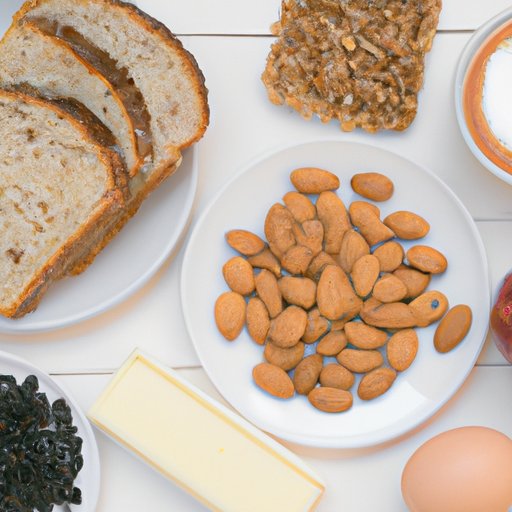Introduction
Carbohydrates are an important part of a balanced diet. They provide energy and are found in many foods such as grains, fruits, vegetables, and dairy products. However, too much consumption of carbohydrates can lead to health issues such as weight gain, diabetes, and heart disease.
Many people are looking for ways to reduce their carbohydrate intake in order to improve their overall health and well-being. This article will provide a comprehensive guide on how to stop eating carbs, including healthy alternatives, mindful eating, protein-rich foods, avoiding processed carbohydrates, cutting back on added sugars, and getting adequate sleep.

Replace Carbs with Healthy Alternatives
One way to reduce your carb intake is to replace them with healthier alternatives. Consider adding more vegetables, legumes, nuts, and seeds to your diet. These foods are low in carbohydrates and high in fiber, vitamins, and minerals. They can help you feel fuller for longer and provide essential nutrients for proper bodily function.
Vegetables are especially beneficial for reducing your carb intake. Not only are they low in carbohydrates, but they are also packed with vitamins, minerals, and antioxidants. Legumes, such as beans and lentils, are also excellent sources of protein, fiber, and other nutrients. Nuts and seeds are also great sources of healthy fats and protein.
Practice Mindful Eating
Mindful eating is the practice of being aware of what and how much you are eating. It involves paying attention to your body’s signals and responding accordingly. When eating carbohydrates, it is important to savor each bite and focus on portion control. Eating slowly and mindfully can help you to be more aware of when you are full and prevent overeating.
It is also important to pay attention to your emotions when eating. Many people turn to carbs for emotional comfort, so it is important to recognize these feelings and find healthier ways to cope with them. If you find yourself craving carbs, take a few moments to pause and reflect on why you are feeling this way. Then, choose a healthier option that can provide the same level of satisfaction.
Eat Protein-Rich Foods
Eating protein-rich foods can help to reduce your carb intake. Protein helps to keep you feeling full longer and can help to regulate your blood sugar levels. Good sources of lean proteins include fish, chicken, eggs, tofu, and Greek yogurt. Incorporating these foods into your diet can help to reduce your cravings for carbs.
Protein-rich foods can also help to build muscle, which can increase your metabolism and burn more calories. Eating enough protein can also help to maintain healthy bones and skin and support a healthy immune system. Additionally, protein can help to reduce inflammation, which is linked to many chronic diseases.
Avoid Processed Carbohydrates
When reducing your carb intake, it is important to focus on eating fresh, whole foods. Processed carbohydrates, such as white bread, pasta, and rice, are high in refined sugars and lack essential nutrients. Instead, opt for whole grains, such as quinoa, oats, and brown rice. Whole grains are higher in fiber and provide more vitamins and minerals than processed grains.
Whole foods are also lower in calories and can help to reduce your calorie intake. Eating fresh, whole foods can also help to support a healthy digestive system and reduce your risk of certain diseases. Additionally, whole foods tend to be more satisfying and can help to reduce cravings for unhealthy snacks.
Cut Back on Added Sugars
Added sugars are found in many processed foods and can contribute to weight gain and other health issues. Reducing your intake of added sugars can help to reduce your carb intake and improve your overall health. Start by reading labels and limiting foods that are high in added sugars, such as candy, cakes, cookies, and sodas.
Cutting back on added sugars can help to reduce your calorie intake and promote weight loss. It can also help to reduce your risk of developing diabetes and heart disease. Additionally, reducing your intake of added sugars can help to improve your mood and energy levels.
Get Enough Sleep
Getting enough sleep is essential for optimal health. Lack of sleep can lead to increased hunger and cravings for carbohydrates. Aim for 7-9 hours of sleep per night and try to go to bed and wake up at the same time each day. Avoid caffeine and alcohol close to bedtime and create a relaxing bedtime routine to help you get to sleep.
Adequate sleep can help to reduce stress and improve concentration, memory, and mood. It can also help to reduce your risk of obesity and improve your overall health. Getting enough sleep can also help to reduce cravings for unhealthy foods and promote weight loss.
Conclusion
In conclusion, reducing your carb intake can be beneficial for your overall health and well-being. To do this, consider replacing carbs with healthier alternatives, practicing mindful eating, eating protein-rich foods, avoiding processed carbohydrates, cutting back on added sugars, and getting enough sleep. With the right strategies and lifestyle changes, you can successfully reduce your carb intake and improve your health.
(Note: Is this article not meeting your expectations? Do you have knowledge or insights to share? Unlock new opportunities and expand your reach by joining our authors team. Click Registration to join us and share your expertise with our readers.)
